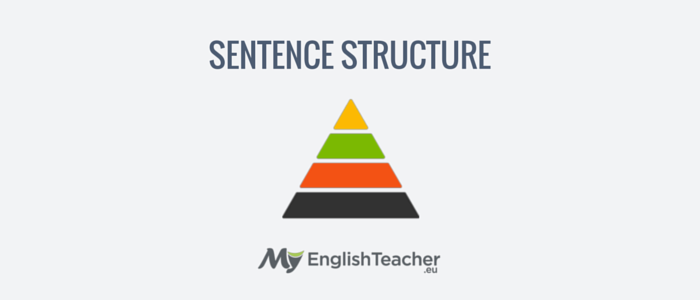
How can you improve your comprehension of sentence structure in English?
If you want to improve your understanding of how English works, it’s really worth looking at sentence structure and sentence types.
Every sentence gives information about someone or something. This someone or something is called the SUBJECT.
The subject can be
- a person (Susan),
- more people (My husband and I)
- or basically anything (My life, A dog, The weather, Our society etc).
The information that is given about the subject is called the PREDICATE.
See the predicate in the following sentences in bold. You can use coloured highlighters at home when analysing sentences.
- Susan is married.
- My husband and I have been married for eight years.
- My life is exciting.
- There is a dog in the garden.
- The weather is getting better.
- Our society is facing new challenges.
I usually advise beginners to begin sentences with the subject and build it up from there. This word order is very common in English:
George’s parents (who?)
moved to a small town (do what?)
last year. (when?)
We (who?)
are going to celebrate my sister’s birthday (do what)
next Saturday. (when?)
Then you can add extra information:
George’s elderly parents
moved to a small town in the north
last year.
We
are going to celebrate my younger sister’s eighteenth birthday
at our parent’s house
next Saturday.
A part of a sentence that contains a subject and a predicate is called a CLAUSE.
There are four main sentence types:
1. SIMPLE SENTENCE
It contains one, independent clause.
- I love literature.
2. COMPOUND SENTENCE
It contains two independent clauses that are connected with one of these linking words: BUT, OR, AND, SO
- I love literature, but my husband hates it.
3. COMPLEX SENTENCE
It contains one independent clause plus extra information in a ’dependent clause’.
Dependent clauses don’t make sense on their own. They are linked to the independent clause with words like WHILE, WHEN, BEFORE, AFTER, IF, ALTHOUGH etc.
- I love literature although I hated it as a child. (’although I hated it as a child’ makes no sense without ’I love literature’)
4. COMPOUND-COMPLEX
It contains minimum 3 clauses: 2 independent clauses and one or more dependent clauses.
- I love literature, but my favourite subject is history because it’s more interesting.
The types of sentences you use in your writing might make a big difference:
- if you use simple sentences only, it will be boring and unsophisticated
- if you use compound-complex sentences with lots of dependent clauses, it will be difficult to understand
My advice is to vary the length of your sentences to keep your readers entertained.
Read more:
4 Main Types of Sentence Structures
To get the word order right in long sentences, you can do two things:
1. read a lot
2. practise
Reading is obviously a great excercise, you’ll see hundreds and hundreds of correct sentences which will help you form a subconscious understanding of how sentences work. You can start with easier texts to familiarize yourself with the basic structures first.
Practice is essential if you want to improve, so start writing right now. Visit our facebook page and join the conversation there. Keep a diary or write a blog about something you’re interested in. Write poems and short stories. Anything that will make you construct sentences in English.
Read more:
18 Powerful Websites to Improve Your Writing Skills in English
LIVE Video Chat Room For English Learners
6 Ways to Improve Your English Writing Skills Using Cool Websites
There’s a game I like to play with my students:
I write a simple sentence on the board then see how many words they can add to it to make it longer and longer. This is a really useful exercise.
We might start with:
- I called Jenny yesterday.
Then start adding words:
- My mother and I called Jenny yesterday.
- My mother and I called Jenny yesterday to talk about the reception.
- My mother and I called Jenny yesterday to talk about the wedding reception.
- My mother and I called Jenny yesterday morning to talk about the wedding reception.
- My mother and I called Jenny yesterday morning to talk about the wedding reception again.
- My mother and I called Jenny yesterday morning to talk about the wedding reception again because she had forgotten to call us back.
- My mother and I called Jenny yesterday morning to talk about the wedding reception again because she had forgotten to call us back as usual.
OK, this last one might be a bit too long 🙂
I hope you’ve find this useful. Remember, it’s good practice to write, so feel free to ask questions or share your own tips with us.
Read more:
List of Sentence Connectors in English with Examples!
Examples of Conjunction Words in a Sentence!
How can I improve my comprehension of sentence structure in English?


























